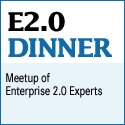I believe that much of the functionality we see in Enterprise 2.0 software today will eventually be integrated into other enterprise applications. In fact, I would not be surprised to see that beginning to happen in 2010, as the effects of the recession continue to gnaw at the business climate, making it more difficult for many vendors of stand-alone E2.0 software tools and applications to survive, much less grow.
Smart questioning in this thought-provoking piece on the Enterprise 2.0 software market by Larry Hawes. My take has two perspectives:
One is technology-related – while I assume that the shake-out will take longer than he predicts, the eventual outcome will be indeed in favor of systems with open APIs, standard-adherent mode of interconnectivity etc. It’s a good time for open source players thus too, making the situation more complex than if we were to look at “vendors” alone. But why will it take longer? Reasons include everything from vendor lock-in, a tough time for budgeting for yet another switch of systems and a general fear of “having to go through all that integration hassle” again.
Second perspective is a bit more strategically, ie. factual market consolidation will be highly dependant of how the big players proceed. Big players like Oracle, SAP and Microsoft. Yes, I am speaking of elephants in the living-room. It will be interesting to see how they (and their acquisitions) will deal with the need for integration and interplay that are emerging as needs. I guess that the winners in that bigger race have to find a way to integrate various and diverse Enterprise 2.0 software application suites into their systems. This will also mean that they have to tweak their understanding of “integrated suite” as well. Thus, E2.0 may be the virus that changes the workings and DNA of its host (in a stealthy und unexpected way?) …
 Dem Thema Enterprise 2.0 tut etwas Realismus gut, insofern freue ich mich auch darauf dass wir in drei Wochen mit dem
Dem Thema Enterprise 2.0 tut etwas Realismus gut, insofern freue ich mich auch darauf dass wir in drei Wochen mit dem  I know this is on short notice but as I guess that some of my readers (and twitter followers) are still in Munich for the Discuss&Discover I thought it’s worth the try.
I know this is on short notice but as I guess that some of my readers (and twitter followers) are still in Munich for the Discuss&Discover I thought it’s worth the try.


